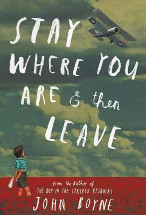Stay where you are and then leave by John Boyne

Doubleday, 2013. ISBN 9780857532947.
(Age: 11+) Highly recommended. War, Home front, Shell shock. The day
Alfie turns five is the day war starts in Europe. Alfie will never
forget it and even though his family and a few neighbours celebrate
that night, he will not celebrate another birthday for many years.
Even worse, despite his father promising to stay with them, he joins
up and leaves, mum having to become a nurse to earn some money, and
then when that proves not to be enough, Alfie borrows their
neighbour's precious shoeshine kit and sets himself up at King's
Cross Station. Despite asking questions of his mother, he cannot
learn anything about his father's whereabouts, and then his letters
stop.
He shines the shoes of many men passing through on their way to
work, but one day a doctor drops his folder, and helping him pick
all the papers, Alfies spies his father's name, and the hospital
where he is staying.
He determines to go and help him get back home. Here he finds an
utterly changed man and convinced that he will do better at home,
surrounded by those who love him, determines to help him get there.
Behind the story of Alfie and his family, we see World War One and
its impact on those at home, their privation, their efforts to make
ends meet, the suspicion amongst people who have been neighbours for
years, the impact of a white feather, the arrival of military police
at the door.
Through Alfie's nine year old eyes, we are privy to the cruelty of
war and its imposition on millions of people, and the questions that
remain unanswered. Alfie and his family are part of the street where
their friends live and the impact of the war is felt by all as Boyne
cleverly shows the ranges of effects on a variety of people. We see
those for whom war is a fight to be fought, women sending their
husbands off, while others want them to remain home. There are the
older men who see it as a glorious thing, the conscientious objector
who refuses to kill, those who beat him up for his views while
others nurse the ones who return with shell shock, an unknown
disease, one thought to be another word for cowardice.
This multi-layered story reminds the readers that war is made up of
ordinary people, and it is their lives which are disrupted and
overturned by policies made by others far removed. I was struck by
the way that Boyne, author of The boy in the striped pyjamas, covered so many other facets to war, the growing
independence of women, the call for Suffrage, the development of
psychiatric nursing, rationing, the impact of war on the rail and so
on, all making a fascinating background to a thoroughly involving
story.
Fran Knight